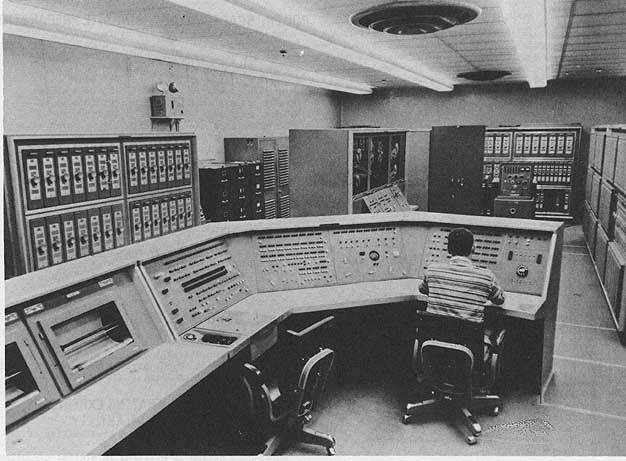Let me tell you a little bit about computers in 1966. They weren’t anything like they are today. They were giant behemoths owned only by the largest companies, and they were run by qualified operators in large, air-conditioned rooms. This was a typical one:

Everything you see in that image is part of one computer, and I’d be willing to bet the computer went on far beyond that. In 1966 there was no internet, no cell phones, no digital anything really. There weren’t even calculators. Wikipedia says the first pocketable calculators weren’t even made until 1970. Think about that for a minute.
A warning from back then
That’s why this text is so chilling:
It had to happen sooner or later in this age of industrial espionage, but it is still disquieting to learn that spies already are at work picking the brains of electronic computers.
This revelation came from a meeting on computer privacy sponsored by the Federal Bar Association in Washington. One instance cited was a computer expert who programmed his firm’s computer to provide himself with thousands of dollars in free communications services. His embezzlement by computer was not discovered until a friend tipped the firm.
Sufficient numbers of other cases have been uncovered to cause concern that the revolution in information storage has opened new vistas for the unscrupulous. The computer age is in its infancy. By the time it is in full bloom a few years from now, most written records will have been replaced by central banks which can divulge the innermost secrets of an individual or a firm literally at the push of a button.
Banks have never been able to completely safeguard against robbery or embezzlement, but they protect their customers with insurance. What insurance can compensate a person whose life’s secrets have been spilled to a blackmailer, or a firm whose secret processes or customer list have been sold to a competitor?
Many persons are concerned by the assault on personal privacy by electronic listening devices. These instruments are child’s play compared to the possibilities in computer espionage.
The Internal Revenue Service, which has a questionable history of divulging its records to many federal and state agencies anyway, now has 68 million tax returns stored in one computer operated by a 30-man team. The IRS has found certain of its confidential tax information being passed to private investigators.
Every man, it is said, has his price. That goes double for computers controlled by men.
That text appeared in the Sandusky Register, an Ohio newspaper, back in 1966. (Keep in mind, when they said “men,” they meant humans in general. It was a different world.) It sure sounds like they got things right, didn’t they?
What else did they know?
Those folks back in ’66 accurately predicted the privacy scandals that seem to happen on a daily basis, and they did it using typewriters and lead type. Pretty impressive. Of course, they also probably died of lung cancer shortly after from all the cigarettes they smoked in the newsroom. That’s not the point.
Of course, there are probably thousands of predictions made every year. Maybe one or two does a good job of describing life in fifty years. If I told you that by 2072 the chickens will have risen up and will be frying us, it’s a valid prediction. It’s just not one likely to actually happen. I don’t know what was going on in the heads of those reporters back then. I don’t know how many other predictions they made that ended up being hogwash. But this one stands out as a pretty good example of how they got it right, at least once.



